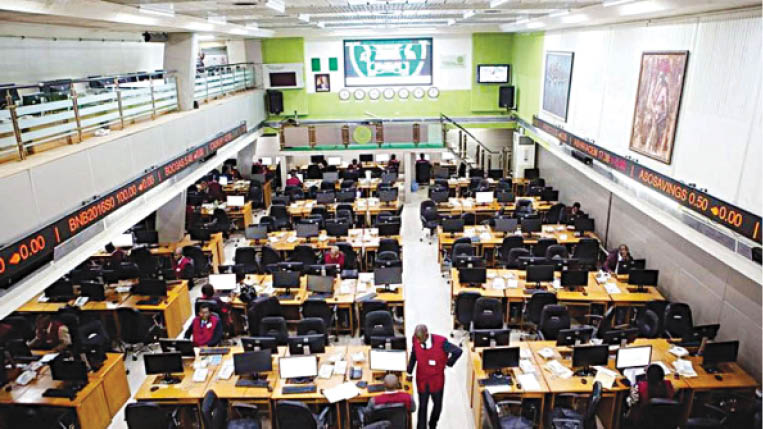The level of participation of foreign investors in the Nigerian stock market has fallen to 11 per cent, as the exit of foreigners from the local bourse continues, an official of the exchange has said.
“We have seen a gradual slowdown of foreign participation in the market. From the highs of over 60 per cent in 2014, we have seen that slowdown to about 11 per cent at the end of 2022. So, there has been a significant slowdown,” Mr Kazeem Alimi, Head of Secondary Market, Nigerian Exchange Limited, said on a breakfast programme organised by Vetiva Capital Management Limited.
Mr Alimi spoke on the topic “Market Participation – Hurdles to Foreign Inflows”.
He said this is the culmination of a trend seen over the years, as foreign participation in the local market dived from 26 per cent in 2020, down to 22 per cent in 2021 before falling by half at the end of last year.
Nigeria to attain 2m barrels daily oil production soon – Sylva
NANS lauds PenCom DG as pension assets hit N14.99trn
He said this is the opposite of what is happening in other African markets where foreign participation is on the rise. “If you compare the Nigerian market with its peers around Africa, like the Johannesburg Stock Exchange in South Africa, and Nairobi Stock Exchange in Kenya, it will appear that Nigeria is fairly lagging in terms of foreign participation,” he said. For the Kenyan market, he said foreign participation has hovered around 55-60 per cent over the last five years.
In 2018, when foreign participation in the Nigerian market was 50 per cent, it was around 20 per cent for the Kenyan market. By 2019 for Nairobi, it tripled to about 60, while Nigeria remained at 50 per cent. “Meanwhile, Nairobi has been able to sustain it at that level of 60 per cent participation by foreign investors, while Nigeria has actually been going the other direction,” Alimi said.
Looking at the market in terms of participation, what we have seen so far is a market that has slowed down in terms of participation of foreign investors, while local investors have been able to take up that tab.
Over the same period, Alimi also said the participation of institutional investors has also risen over the past four years on average to about 70 per cent with retail investors accounting for the remaining 30 per cent.
On the reasons for the exodus of foreign investors from the local market, Mr Alimi said these relate to such factors as corporate performance and governance issues, investor sentiments, and macroeconomic issues.
But “the elephant in the room is the FX,” he said. “Foreign investors are coming from outside, which implies that they are coming with their own currencies; they are not coming with the naira. They are coming with their own currencies to convert into naira. What that means is that they would be concerned with the exchange rate at which they will change the money they are coming into the country with, and at what exchange rate will they be exiting the market compared with the returns they expect from the country over that period.
“These are the key things that they are going to be looking at. Those concerns have been an issue for them because of the FX liquidity that has deteriorated over the last three years, since 2020, to be precise. We have seen the FX liquidity deteriorate and this has been the primary concern for foreign investors,” Alimi said.
Foreign investors also look at such parameters as inflation and interest rate, to give them a direction on FX in terms of how these will impact on the FX.
“FX is impacted by these variables. They also look at dividend yields, which are part of the returns that investors are interested in. When dividend yields are not so strong, the expectation is that capital gains will be very strong so that total gains will be very reasonable. So, if those two are questionably low, or not attractive compared with other markets in which they operate, it will cause concern,” he said.
Alimi said Nigeria needs the inflow of foreign investments. “Whether we like it or not, we need foreign savings because local savings cannot be sufficient for us to meet demands, drive the market, and create sustainable liquidity in the market. We need foreign savings; we need foreign players to come into your market to deepen your market and create liquidity,” he said.
Speaking on how the general elections could potentially affect foreign participation in the local market, Alimi said this would depend on the outcomes of the polls. He said as a frontier country, what is always expected in Nigeria is that during election periods, there are always concerns around transitions. “So, if you are able to navigate the transition period, it will have a positive impact on the investors then it will improve their interest in the market,” he said.
The idea is that once the change of baton is successful, and you cross over from one government to the other, that alone is positive for the market, and from the foreign investor’s point of view it will also be positive, he said.
The stock market gained 0.78 percent on Monday, raising the gain year-to-date to 5.8 percent. The market gained 19.98 percent in 2022, and 6.07 percent in 2021.




